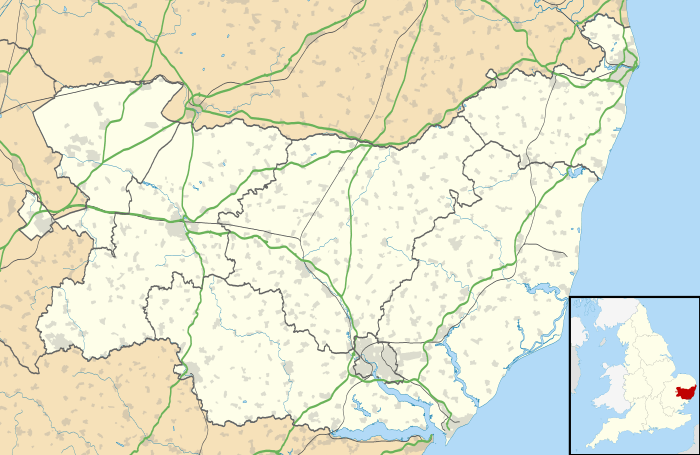Santon Downham
| Santon Downham | |
|---|---|
 Santon Downham, Church of St Mary | |
 Santon Downham | |
| Santon Downham shown within Suffolk | |
| Population |
240 (2005)[1] 237 (2011)[2] |
| District | |
| Shire county | |
| Region | |
| Country | England |
| Sovereign state | United Kingdom |
| Post town | Brandon |
| Postcode district | IP27 |
| Police | Suffolk |
| Fire | Suffolk |
| Ambulance | East of England |
| EU Parliament | East of England |
Santon Downham is a village and civil parish in the Forest Heath district of Suffolk in eastern England. In 2005 it had a population of 240.[1] The village is located within Thetford Forest on a meander of the River Little Ouse on the Norfolk-Suffolk border. Thetford is 4 miles (6 km) southeast and the nearest railway station is in Brandon 2 miles (3 km) west.
History
The village was the administrative centre for HM Forestry Commission for many years following the planting of ten of thousands of trees in the Breckland area to form the Thetford Forest. The District office and staff were housed in 1960s office building close to the site of the now demolished Santon Downham Hall. The Hall garden formed the base for the nursery department of the district. The HM Forestry Commission Repair depot was built close by in an award-winning design building, next to which stood the HMFC fire station. A Bedford 'green goddess fire tender and a water tanker were kept in the fire station due to the high fire risk in the area.
The bridge over the River Little Ouse appeared in an episode of BBC's Dad's Army when Captain Mainwaring and his troops attempted to demolish it.
Downham Hall
Downham Hall was a seven-bay brick house, with a projecting porch and a higher, three-floor, three-bay centre It had a shallow bow to the rear garden. The Wrights family at the hall for more than 150 years in the 17th and 18th centuries. Thomas Wright brought Santon Downham to public notice in 1668 with his dramatic account of a sand flood and how his house became “almost buryed in the Sand”. In Thomas Wright’s day, in 1647, a substantial house of 12 hearths was recorded.[3]
In about 1800 the hall was bought by the Charles Cadogan, 1st Earl Cadogan. The Ipswich Journal described the estate: "Mansion sashed, fronting South, with all conveniences, gardens, meadows &c… [with] rights of fishing and swanning". In 1829 the house was described as being "a modern house of apparently the former part of the last century", suggesting that the Cadogans, who used the estate as a shooting lodge, had refurbished it. It has been suggested that Capability Brown may have advised on the landscaping, as he was deputy to the Earl, who was Surveyor of the King's Gardens.[3]
Lord William Paulett, later the 3rd Duke of Cleveland, took ownership in 1830 and architect Lewis Vulliamy was brought in, in 1836, to perform alterations, probably as a result of a fire. It is believed that the Duchess established the avenue of limes.[3]
In 1871 the hall, described as a "noble mansion built of white Suffolk brick, situated in a well-timbered park", was bought by Edward Mackenzie. During the First World War the British Pioneer Corp and Canadian troops, who were lumberjacks, were stationed at Downham. In 1918 the estate was sold for £75,310 and was then owned by a succession of land speculators and companies. It was eventually acquired by the Forestry Commission. It was demolished in the 1920s, but some parts of the hall still remain: the billiard room and the ice house, which is a listed building,to the south. the coach house lies to the west and the tack room to the north. Some elements of the park and gardens also still survive.[3]
References
- 1 2 Estimates of Total Population of Areas in Suffolk Suffolk County Council
- ↑ "Civil Parish population 2011". Neighbourhood Statistics. Office for National Statistics. Retrieved 27 August 2016.
- 1 2 3 4 "Downham Hall – Santon Downham". santondownham.org. Retrieved 16 September 2016.
External links
- Village website
- Village Hall website
- Parish Council website
- Explore Santon Downham at forestry.gov.uk
![]() Media related to Santon Downham at Wikimedia Commons
Media related to Santon Downham at Wikimedia Commons